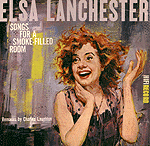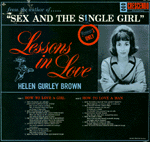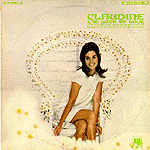|
Thrift
Store Record Reviews
By James T. Call
I like modern music just fine and I shop in regular record stores.
But music shopping in thrift shops is a completely different dimension.
I’m astounded by some of this stuff. What kind of people made
these records—and why!?
Maybe
you got it bad like me. The thrift store record bug. Then you
already know what it’s like. When you pull up into an Amvets or
a Goodwill, you know right where to go. You navigate unerringly
through the aisles of used clothes, obsolete appliances, astonishing
and mundane knick-knacks, right to a display case stuffed to overflowing
with old records. What was that display case used for originally—30
years ago? Greeting cards? Nylons? Not records! You can only fit
a few on each row of shelves steeply tiered like stadium seating.
And they always stuff too many in, making it difficult to finger
through. Nearby on the floor are boxes and milk crates of records
catching the overflow they couldn’t jam into the cases. As you
begin to fan through the albums, dust lightly rises to your face.
That smell. I’ve browsed thrift store record bins coast to coast
and that smell, it’s always the same.
Looking
through the stack from the front, hmmm, let’s see…Nutcracker
Suite,Perry Como Sings Christmas Songs, Dukes of Dixieland,
Randy Newman–Little Criminals, Flash, David Lee Roth, Ray
Redd, David Bowie–Changes, The Philadelphia Orchestra,
Keith Green, Rush, Best Loved Hymns, Helen Reddy–I Am Woman,
The Mormon Tabernacle Choir, Elsa Lanchester… Elsa Lanchester?
She made a record? The title is Songs For A Smoke-Filled Room.
And yep, it’s songs and she’s singin’ ’em. Songs with titles like,
“Never Go Out Walking Without Your Hatpin,” “If You Peek In My
Gazebo,” and “When a Lady Has a Piazza.” It’s 95 cents. I wonder
what condition the vinyl is in. It’s okay. Well, all right, I’ll
pay a buck to see what this is all about.
 And
there you go. Not 20 records into the bin and you’ve already
found one. Maybe not a great one. But you didn’t pick
the record because you thought it was going to be great
You picked it because you’ve seen Elsa Lanchester in old
movies and she is usually fun, quirky even, and you’re
curious. You’re curious what she sounds like singing “Linda
and her Londonderry Air.” And you’re not going to find
that in Tower Records or Amazon.com. Ebay may get you
a little closer—but not much. That’s for “collectors.”
You’re not looking at records for monetary worth. In fact,
if you go to a thrift store looking for rare Beatles singles
or James Brown on the Federal label or Howlin’ Wolf on
Chess—well, it’s possible, but so is finding a million
bucks in a bag by the curb. There are records there that
are worth some money, but so few and far in between as
to make the effort more costly than the results. No, what
you’re looking for you can’t find anywhere else. You’re
looking for remarkable recordings that are outside your
normal experience. Anthropological timeboxes from Culture
Land. Some of them come from a completely alien landscape.
Zero cultural frame of reference. Might have been made
by pixies as far as you can tell. Others have cultural
references more recognizable—but still far enough removed
by time and by other barriers to make the view oblique
and piquant. Like these: And
there you go. Not 20 records into the bin and you’ve already
found one. Maybe not a great one. But you didn’t pick
the record because you thought it was going to be great
You picked it because you’ve seen Elsa Lanchester in old
movies and she is usually fun, quirky even, and you’re
curious. You’re curious what she sounds like singing “Linda
and her Londonderry Air.” And you’re not going to find
that in Tower Records or Amazon.com. Ebay may get you
a little closer—but not much. That’s for “collectors.”
You’re not looking at records for monetary worth. In fact,
if you go to a thrift store looking for rare Beatles singles
or James Brown on the Federal label or Howlin’ Wolf on
Chess—well, it’s possible, but so is finding a million
bucks in a bag by the curb. There are records there that
are worth some money, but so few and far in between as
to make the effort more costly than the results. No, what
you’re looking for you can’t find anywhere else. You’re
looking for remarkable recordings that are outside your
normal experience. Anthropological timeboxes from Culture
Land. Some of them come from a completely alien landscape.
Zero cultural frame of reference. Might have been made
by pixies as far as you can tell. Others have cultural
references more recognizable—but still far enough removed
by time and by other barriers to make the view oblique
and piquant. Like these:
SONGS
FOR A SMOKE FILLED ROOM
ELSA LANCHESTER
So,
okay, it didn’t turn out to be a great record. As a matter
of fact, it’s nearly unlistenable. Elsa (The Bride of Frankenstein)
Lanchester sings (caterwauls) in a somewhat Liza Doolittle cockney,
ribald (nudge nudge) British pub songs. The wink-and-a-nod salaciousness,
too, completely loses meaning in the modern age. At a time when
certain words were never spoken in polite society, the need to
cleverly veil sexual subjects with oblique double meanings—and
why it was amusing to do so—would have been instantly understood.
Today that need, James Bond movies notwithstanding, is much more
obscure. The kind of straightforwardness we take for granted would
have landed you in jail 40 years ago, and Danielle Steele would
have been arrested as a vile pornographer.
The
degree to which the meanings are obscured and how cleverly veiled
the references are on this record makes for an interesting measure
of just how much things have changed in this regard. Another odd
and interesting thing about this record are the droll introductions
to each song by Elsa’s husband, Charles Laughton. Laughton was
a consummate actor who could be imperious (Captain Bligh), or
abject (Quasimodo), or imperious and abject (Emperor Nero), with
equal aplomb. Here he intones aristocratically an explanation
or a sly bon mot at the beginning of each ditty. His introduction
to the record as a whole at the beginning of side one is an apologia
of Elsa’s singing style, and of double entendre in general. In
fact, he recites a limerick that addresses the groan factor inherent
in double entendre even back then.
There
once was a girl of Boulang
Who sang a most popular song
It wasn’t the words
That frightened the birds
But the horrible double entendre
Touché,Chuck.
LESSONS
IN LOVE
HELEN GURLEY BROWN
 “I’m
a lucky girl, that’s who I am. Last year I wrote a book called
Sex and the Single Girl
(a girlish, gurgling, non-literary kind of thing), which became
a best-seller. I didn’t mean to write a best-seller…I mean I didn't
write the most sexy, salacious, naughty little book I could think
of with the idea that if it is shocking enough it’s bound to sell
well.” So writes Helen Gurley Brown in the backside liner notes
of this record. At the beginning of the album, she explains that
she had “so many things left over to say” that she decided to
put out a record, in the way of an addendum, I guess, of advice,
“not just to single girls, but to married girls and men.” It turns
out to be sort of a “Hints From Heloise” style list of admonitions
on “how to have an affair.” Side 1 for men. Side 2 for women. “I’m
a lucky girl, that’s who I am. Last year I wrote a book called
Sex and the Single Girl
(a girlish, gurgling, non-literary kind of thing), which became
a best-seller. I didn’t mean to write a best-seller…I mean I didn't
write the most sexy, salacious, naughty little book I could think
of with the idea that if it is shocking enough it’s bound to sell
well.” So writes Helen Gurley Brown in the backside liner notes
of this record. At the beginning of the album, she explains that
she had “so many things left over to say” that she decided to
put out a record, in the way of an addendum, I guess, of advice,
“not just to single girls, but to married girls and men.” It turns
out to be sort of a “Hints From Heloise” style list of admonitions
on “how to have an affair.” Side 1 for men. Side 2 for women.
“How
to get a girl to the brink and how to keep her there when you’re
not going to marry her" is the title of the first track.
Included in this section are gems like, “Never drink up her booze
without replacing it.” “Money is a perfectly wonderful present,
nor is it half as insulting as you’d like to think. A nice share
of General Motors or a U.S. ‘E’ bond tucked in with a bottle of
Arpege really are very hard to take offense at.” “Never, never,
never let her spend her birthday alone even if you have to lie
your way into purgatory to get out of the house.” “Never lie to
her about little things. The big lie you are living that someday
the two of you are going to be married is going to hard enuff
to explain when the time comes.” “Never, never cheat on her with
anyone but your wife.” There are hundreds of equally outrageous
statements. Then you flip it over.
The
first track on the second side offers help with, “Capturing a
man if you aren’t pretty.” So it continues for the women, just
as sneaky and devious, and just as much fun. This list of adultery
do’s-and-don’ts has such a ring of hard-nosed practicality though,
that it comes off as some sort of “How To Have An Affair For Dummies”
and resonates especially shrill now. Our own time seems positively
puritanical next to this compendium of freewheeling advice from
the author of a book that was, you have to admit, a major proponent
of The Sexual Revolution. Helen sounds like a kind of “anti-Dr.
Laura.” I love that.
THE
LOOK OF LOVE
CLAUDINE LONGET
 When
Claudine Longet shot and killed her boyfriend, U.S. Olympic ski
champion Spider Sabich, in the home they shared among the cocaine
and carrot juice cognoscenti of Aspen, Colorado, in 1976, some
people said she got away with murder. They say it was the influence
of her estranged husband, singer Andy Williams, and his high-powered
lawyers that resulted in a ruling of “criminal negligence” and
a sentence of only 30 days in the high profile murder case. The
circumstances of the shooting, the fact that their relationship
had soured—Sabich had told her to move out—and talk of suppressed
evidence had skeptics shaking their heads. When
Claudine Longet shot and killed her boyfriend, U.S. Olympic ski
champion Spider Sabich, in the home they shared among the cocaine
and carrot juice cognoscenti of Aspen, Colorado, in 1976, some
people said she got away with murder. They say it was the influence
of her estranged husband, singer Andy Williams, and his high-powered
lawyers that resulted in a ruling of “criminal negligence” and
a sentence of only 30 days in the high profile murder case. The
circumstances of the shooting, the fact that their relationship
had soured—Sabich had told her to move out—and talk of suppressed
evidence had skeptics shaking their heads.
Whatever
the facts, murder may be more in evidence here on this record.
Try it out on a room full of people at your next party. A few
might be intrigued, charmed, or even enthusiastic about the whispered,
French-accented, faux-little-girl vocal. The rest, however, will
run screaming from the room. I know. I’ve done it.
It
may not be that whispery vocal that is the most grating thing
about this record. Indeed, that vocal style has turned out to
be rather durable. It took the Paris Sisters to a top-ten hit
as early as 1961. And in the intervening years this style has
been employed with varying degrees of success by groups like Mazzy
Star, The Cranes and more than a few pop trip hop artists. Morcheeba
and Baby Fox employ female vocals that are very breathy and immediate.
Techno artist Robert Myles does too. Recently, Mono’s singer,
who sang “Life in Mono” on the soundtrack for Great Expectations,
is spot on the Longet style.
No,it
is not just her sotto voice that will have your party guests congregating
in the kitchen and the bathroom. It will be the sugar. It’s sweeter
than hard candy. But how does she do it? How does she manage to
be so cloying? Maybe it’s the accent. “How een-seen-see-teeve,”
she coos to comic effect in “How Insensitive,” one of the most
delicate and melancholy songs in pop music. Normally, I find a
French accent charming, even sophisticated. But Claudine manages
to subvert whatever worldliness is inherent in the inflection.
Or maybe it’s the Elmer Fuddisms that occasionally creep into
her voice. Her version of the Beatles’ “When I’m 64” is an absolute
howl. “When I get oder, gway in my hair, meeny years fwom now,
wee-oo you stee-oo be seending me a vow-en-tine…”.
Or
maybe it’s simply how absurdly far she carries the little-girlness
of the style. On this record she actually covers that Paris Sisters
hit, “I Love How You Love Me,” which provides a good comparison
for how much higher she ratchets the saccharin in an already syrupy
song.
I’m
sure you can tell by now, in spite of my gleeful trashing, that
I find Longet’s records a lot of fun. This is one of the most
ubiquitous records in the thrift store bins. You should be able
to find one on your very next peruse. I recommend you grab it.
Hell, it’s only a buck.
|










